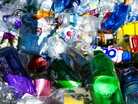Global Plastics Treaty: What a 'No Deal' Could Actually Mean

Global plastics treaty negotiations at the INC-5 Summit in Busan, South Korea, have concluded without resolution, leading to widespread concern and criticism.
The discussions, involving representatives from 200 countries, were anticipated to culminate in a significant agreement.
However, they ceased abruptly on Sunday, overshadowed by the influence of major oil-producing nations.A follow-up to this summit, satirically dubbed INC 5.2, is scheduled for next year.
Challenges in reaching a consensus
The summit in Busan was heralded as pivotal, following two years of deliberations.
The likes of Greenpeace have labelled it "the most important multilateral treaty" since the Paris Agreement in 2015.
Expectations were high that nations would bridge their differences to forge a comprehensive agreement on plastic production and waste.
More than 100 countries rallied behind a new initiative led by Panama aiming for a global commitment to curtail plastic production to "sustainable levels."
However, resistance was formidable, particularly from Saudi Arabia, which orchestrated a collective stance among oil-rich and plastic-producing countries to thwart any measures that might decrease plastic production.
Ecuadorian diplomat Luis Vayas — who chaired the negotiations and who proposed suspending the troubled talks until a later date – says: “While it is encouraging that portions of the text have been agreed upon, we must also recognize that a few critical issues still prevent us from reaching a comprehensive agreement.”
Corporate influence and calls to action
Amid the turbulent negotiations, multinational companies united under the Business Coalition for a Global Plastics Treaty, advocating vehemently for a binding and comprehensive agreement.
With more than 275 members, including prominent corporations like Unilever, Coca-Cola and SAP, the Coalition emphasises the alignment of more than 100 countries on essential aspects such as phasing out plastics and transitioning to sustainable production levels.
It says: “Despite tireless efforts by the INC Chair and government negotiators to finalise a global plastics treaty, it will not be agreed in Busan, as planned.
"We are encouraged by the increased alignment amongst over 100 countries on critical elements such as global phase-outs and sustainable levels of plastic production.
“Never before have so many countries clearly articulated support for these obligations.”
The statement continued by calling the latest text from the INC Chair a “step forward on product design and waste management as a basis for future negotiations”.
But the Coalition said that the failure to agree a deal “further delays critical action to end plastic pollution” and “fails to deliver the certainty that business needs to mobilise investment and scale solutions”.
It said: “There’s no time to waste: we cannot afford this process sliding into unending negotiations.”
Despite these concerted efforts, the conclusion of the talks marked a significant disappointment, delaying essential measures to mitigate plastic pollution and leaving businesses without the clarity needed to forward investments and scale solutions.
Adam Elman, Sustainability Director at Google, affirmed the urgency, citing that global plastic production may surge about 70% by 2040 in the absence of robust policy interventions.
He says: “In March 2022, 175 nations agreed to make the first legally binding treaty on plastics pollution, including in the oceans, by the end of 2024.
“The world produces more than 400 million tons of new plastic every year, while production could climb about 70% by 2040 without policy changes.
“However, countries remained far apart on the basic scope of a treaty and could agree only to postpone key decisions and resume talks, dubbed INC 5.2, to a later date.”
Renewed advocacy and criticism of draft texts
The concluding draft proposed by Chair Luis was met with substantial criticism, particularly from representatives of the Global South.
They, along with numerous lobbyists, voiced their discontent at a press conference, stressing the insufficiency of the proposed text to address the needs of billions who await a strong treaty.
Arpita Bhagat, Plastics Lead at GAIA Asia Pacific, says: “The Chair’s latest text is unacceptable to the majority of Global South countries and the billions of people they represent: people who are fighting for their lives for a strong treaty.
“Once again, as throughout this process, the Chair has bent to the will of the petrochemical states while dismissing the demands of the majority, in a completely non-transparent, exclusionary process.”
Dr Sam Adu-Kumi, Negotiator for Ghana, adds: “The whole world is looking up to us – they are expecting something better that will protect the environment, human health, our brothers and sisters, and our young populations.
“So we are not here to accept anything short of an ambitious treaty.”
A positive perspective?
The influx of plastic waste into our oceans is escalating, with approximately 10 million tonnes entering annually, posing a significant threat to marine ecosystems.
Research suggests that global emissions from plastic production could potentially triple by 2050, potentially consuming up to one-fifth of the planet's remaining carbon budget.
Simultaneously, microplastics are being discovered in various unexpected places, from human brain tissue to breast milk.
The urgency for action is evident. Despite the setbacks at INC-5, some leaders are striving to find silver linings and opportunities for progress.
Anke Boykin, Senior Director Global Environmental Policy, PepsiCo, says: “The momentum is strong. A vast majority of countries support ambitious global rules to address plastic pollution. The political will to take action exists.”
She added: “Progress has been made. Not only in the form of a significantly evolved text but also the debate itself that has reached a new level of depth and nuance. The collective understanding of key issues and needed actions continues to grow.
“There's more to do. The draft text clearly requires more debate, and crucial concepts like Extended Producer Responsibility (EPR) need clearer definitions and globally agreed principles to address vastly varying interpretations and accelerate EPR implementation.”
Make sure you check out the latest industry news and insights at ClimateTech Digital and be part of the conversation at our global conference series, Sustainability LIVE.
Discover all our upcoming events and secure your tickets today. Subscribe to the ClimateTech Digital newsletter.
ClimateTech Digital is a BizClik brand





